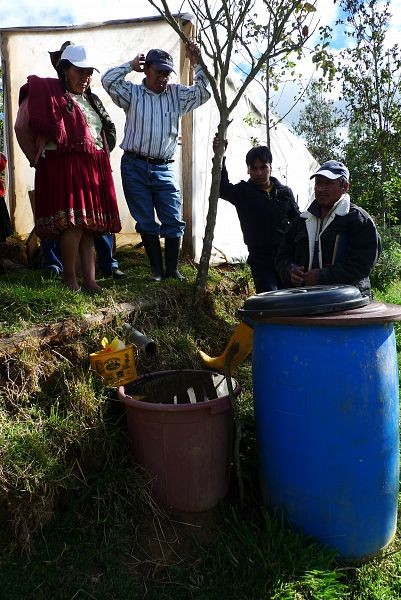In Trelew, Chubut, the students from the local Technical School have installed a new wind-solar hybrid system, capable of providing opportunity for energy self-sufficiency in the rural community.
RedBioLAC: Exchange of biodigester experiences between Ecuador and Bolivia
RedBioLAC’s latest initiative is to organize South–to-South exchanges where one or more experts with extensive biodigester experience travel to another country to provide emergent biodigester programs with more extensive hands-on training, technology transfer and business model development. During June and July 2013, Jaime Marti (expert in the field of biodigesters from Bolivia) spent three weeks in Ecuador, working with different stakeholders to evaluate and improve the use of biodigesters by conducting field visits, workshops and meetings.
He spent time with families using biodigesters in the valley of Intag and visited biodigester projects in Cuenca and San Pedro de Vilcabamab, to name a few. In these regions, 13 biodigesters were evaluated, some of them originally constructed and implemented with the support of WISIONS in 2010.
Contrary to the general wisdom, during the visit, fully subsidized biodigesters were found still operational and in use. Two factors seems to have been influential for the successful adoption (despite 100% subsidy): The digesters are distributed through farmers associations, which provide follow-up and support and all of the systems were connected to stables with cement floors, which make the biodigesters very easy to use, load, and maintain.
One weakness found in Ecuador, similar to other countries in Latin America, is the lack of a diversity of technologies available. In Ecuador, almost all of the biodigesters are of low-cost plastic. Diversifying the sector with, for example, geomembrane biodigesters or dome models, would strengthen the sector by allowing farmers to choose. Subsidies have been either 100% or 0%. The use of high subsidies can be a tool for rapid diffusion of the technology but with the risk of low adoption and effectiveness — although in Ecuador the specific conditions of the agroecological producers have proven to lead to high adoption rates.
To scale up the technology in a responsible form, it is necessary to consider the previous experience of other countries with national biodigester programs and adapt them to the Ecuadorian context. Important elements include quality control, certification of technologies and installers, technical assistance, promotion, research and development, fair and sustainable subsidies, and access to micro-credit.
While other countries may be more advanced in terms of the technology, they may lack the social strategies witnessed in Ecuador. As such, the participation of the Ecuadorian stakeholders in RedBioLAC will be useful for the whole network.
On our Facebook page you can find some photos from this exchange.
And here you can find the detail report of this exchange (only available in spanish).


